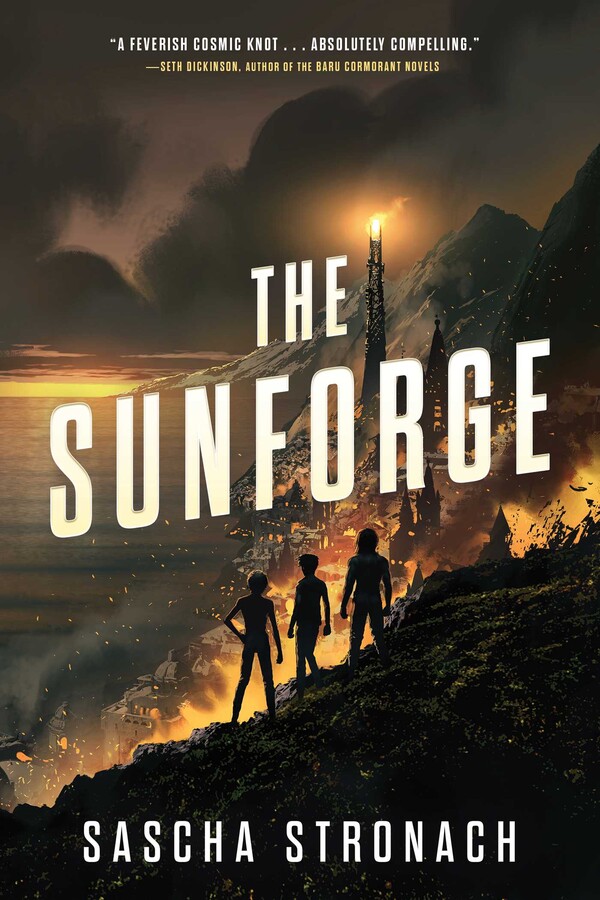The Korekore cleaved through the between-ness, down the aeonic star-roads, timeloose. Somewhere in the darkness, a star turned inwards under its own immense weight, devouring itself – a symphony of shrieking magma vents and the low bass crunch of a gravity well. She turned away from this, and towards the little sound, a timetethered mayfly hum of a distant planet. Stepping between the veils, she walked into the world.
The locals called her The Snail. Art installation, installed in the dead of the night. Legend had it they came back every night and moved her, maybe a fraction of a fraction of an inch. Nobody had ever caught the artist, though many had tried. The council tried to remove her once; a small group of addicts and lovers gathered to protest it, but that wasn’t what kept her in place. The tow truck driver attached chains to her and tried to haul her away, but the engine and tyres screamed and then the crane ripped clean off its bed. Whatever The Snail was made of was heavier than any truck, heavier than the skyscrapers around it, heavier than the molten heart of a star. The protestors chased the driver away, and the council did not send another.
Aroha Henderson smoked weed and painted landscapes and had fitful dreams about one day owning a house. She lived with her girlfriend in a cramped apartment across the road from The Snail, and every night, when her beautiful Janey was asleep, she would creep to the window and watch the statue and hope to see it move. Every Thursday night she took a single photograph, and hung it on a string, until there were too many strings and too many photos, and Janey shouted at her that it was an obsession, that it was just a fucking statue, and they shouted and then fucked and then didn’t talk about it again. Aroha went to the wall of photos one last time, over a year’s worth. She kept the first and last, and threw the rest out. She held them up next to each other, and felt some unnamable emotion stir inside her– the statue had raised a single finger, perhaps a millimetre, across the space of a year. She showed it to Janey, who did not believe her, who said it was a shadow, said it was a dream, said she was only seeing what she wanted to see. They fought again, one more time.
Aroha and Janey did not last, though they did, in that sort of scattershot way small-city lovers do, colliding off each other at parties and events and fucking and then feeling guilty. They each ruined at least one of the other’s marriages, though Aroha told herself she wasn’t keeping score. Her paintings began to sell well, and she got herself a place overlooking The Snail, and every night she would go out and touch its hand and swear she could feel warmth from concrete.
Thirty years passed, and Aroha’s home fell to ruin, and her paintings became more abstract – star-shapes and time-weave, things she didn’t have names for, things that worried her friends and family, until they too withered away and she became a ghost in her own home.
Fifty years passed, and it became hard to take the stairs, and she took to staring out the window at The Snail, which she swore had moved a whole metre since she was a child, whose kind eyes told her promises of places beyond.
Five years passed, and she woke in the dead of night with a pain in her chest that made her snap bolt upright, fast enough to make her bones click. She knew what was coming. She took her walker, and headed down to The Snail, each stair a wail of agony in her chest and her arms and her back. A wave of vertigo struck her and she almost fell, clanging against the walker, feeling things shift and click inside her. Step, step, step, one at a time, moment by lost moment. She reached the Snail, and took it by the hand, and looked deep into its eyes.
The Korekore smiled, and placed a hand around her waist. The city whistled around them, the strobe of day and night flowing like water overhead. For less than a second, flickering beside them, she saw Janey, white and bent with age, standing beside them. The other humans moved too fast to see, but Janey was still, every night, until – after a moment only in this strange new time-ness – she too was gone.
Aroha and the Korekore danced across the square while the skyline rose and fell, and at last they stood together in the dust of the dry world.
“I love you,” said Aroha.
“No,” the Korekore said, “you don’t.”
And they went hand-in-hand, timeloose, down the star-roads and off into the night.
